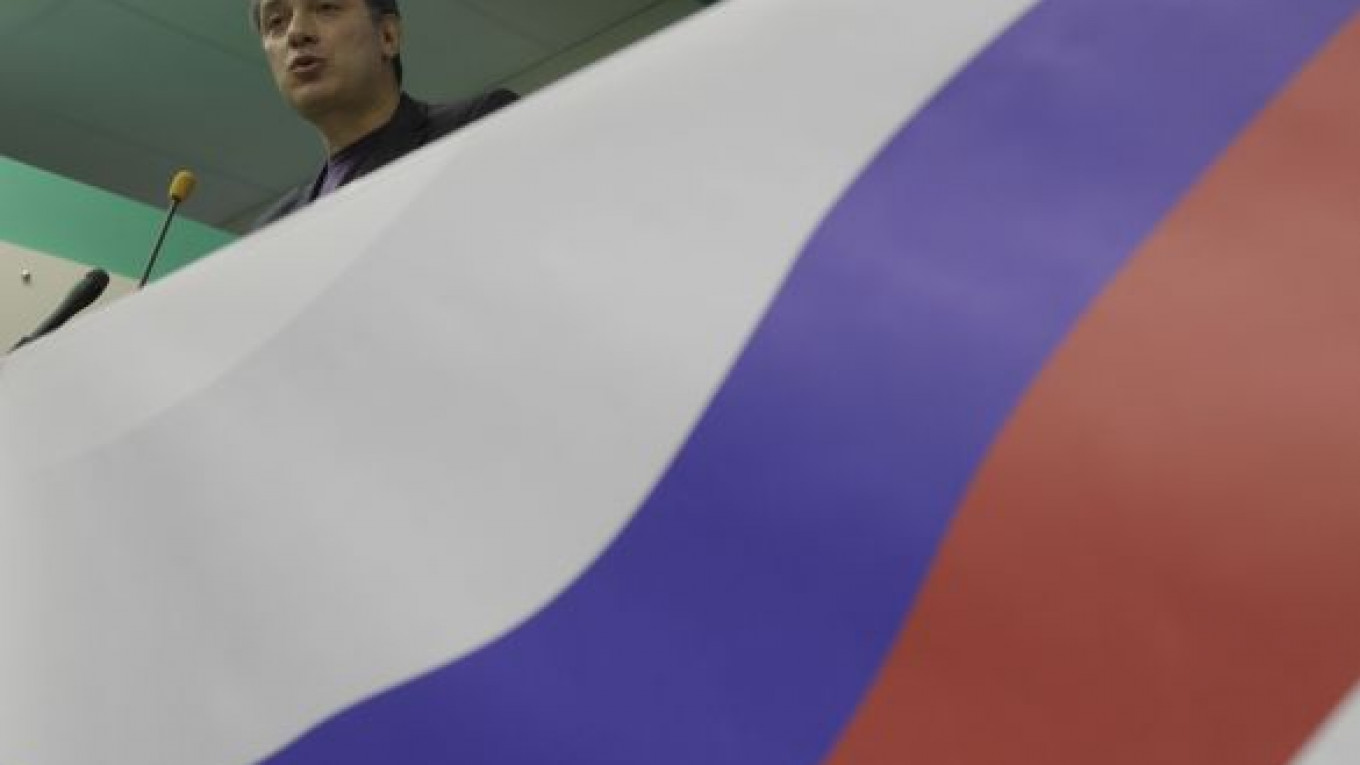Liberal leaders have pledged to get a new party registered as the country prepares for the State Duma and presidential elections, but skeptics doubt if the apparently futile effort is worth it.
Leaders of the Party of People’s Freedom were adamant Monday that even if chances were slim, it was vital to file for registration to establish political credibility.
"Yes, it will be hard, but we need to demonstrate to voters that we want to work for them," party co-founder Vladimir Milov told The Moscow Times.
Current law requires political parties not represented in the State Duma to prove that they have at least 45,000 members in more than half of the country's 83 regions to be registered.
At a party convention in Moscow over the weekend, activists promised to set up organizations in 57 regions and to collect more than 50,000 members before applying for official registration with the Justice Ministry in April.
First styled under the name For a Russia Without Arbitrariness and Corruption, the coalition was revamped in December as the Party of People’s Freedom under the acronym "Parnas" — the Russian name for Mount Parnassus, home of the Muses in Greek mythology.
But analysts said Parnas was unlikely to obtain registration as no entirely new party has managed to do that since the 45,000-member threshold was introduced for the 2007 Duma elections.
"It seems that this is only possible by using existing party structures or uniting with them," Alexei Makarkin of the Center for Political Technologies said about registration for new parties.
He cited the example of Right Cause, a liberal party formed in 2009 with Kremlin support on the basis of the Union of Right Forces.
Each of the four Party of People’s Freedom founders — Mikhail Kasyanov, Boris Nemtsov and Vladimir Ryzhkov in addition to Milov — has his own political movement, but none of those are officially registered.
The Justice Ministry has also rejected registration requests from other movements created by prominent opposition leaders, including Sergei Udaltsov's Left Front and Eduard Limonov's The Other Russia.
Leading members of Nemtsov's Solidarity, the best-known of the four, have argued that filing for registration is futile because the Kremlin would never allow uncompromising political opposition to partake in elections.
"The problem is that there is practically no chance to get registration. Because of this, it is questionable why so many resources should be spent on it," said Oleg Kozlovsky, a member of Solidarity's political council.
While he said he does support People's Freedom, he would abstain from working on the task of getting political registration for it, Kozlovsky said.
Instead, he will focus on forming a new noncommercial organization to strengthen civil society. "With such a weak civil society, parties are useless. This is where we have to start," Kozlovsky said.
Another prominent Solidarity leader, former chess master Garry Kasparov, has so far refused to support Parnas publicly.
But Denis Bilunov, a co-leader of both Solidarity and Kasparov's United Civic Front, said that most of Kasparov's supporters would side with the new political party.
Another Solidarity leader, Ilya Yashin, who was chosen to head the Party of People’s Freedom's Moscow branch, said that at a Solidarity convention in December only 13 of some 200 participants voted against seeking registration for Parnas and that it was a moral duty to file for it.
"It is very important to show voters that we have the organizational capability and the moral right to criticize the government," he said by telephone Monday.
Milov, who quit Solidarity last summer, accusing it of being a "dwarfish organization", said that such arguments go down poorly with voters.
"It will be very hard to explain to them why we did not even try to take part in elections. I believe we have a duty to offer the possibility to vote for a real alternative to [Prime Minister Vladimir] Putin's regime," he said.
Makarkin of the Center for Political Technologies said that, apart from the registration issue, the movement was beset with ideological differences.
Solidarity was dominated by left-wing human rights activists, while Kasyanov, an ex-prime minister, and his former Deputy Energy Minister Milov represented the other end of the political spectrum, he said.
"This will hardly make a stable coalition," Makarkin said.
A Message from The Moscow Times:
Dear readers,
We are facing unprecedented challenges. Russia's Prosecutor General's Office has designated The Moscow Times as an "undesirable" organization, criminalizing our work and putting our staff at risk of prosecution. This follows our earlier unjust labeling as a "foreign agent."
These actions are direct attempts to silence independent journalism in Russia. The authorities claim our work "discredits the decisions of the Russian leadership." We see things differently: we strive to provide accurate, unbiased reporting on Russia.
We, the journalists of The Moscow Times, refuse to be silenced. But to continue our work, we need your help.
Your support, no matter how small, makes a world of difference. If you can, please support us monthly starting from just $2. It's quick to set up, and every contribution makes a significant impact.
By supporting The Moscow Times, you're defending open, independent journalism in the face of repression. Thank you for standing with us.
Remind me later.


